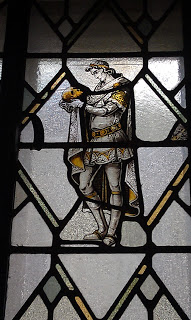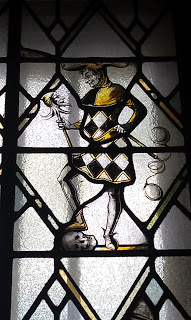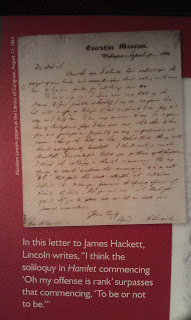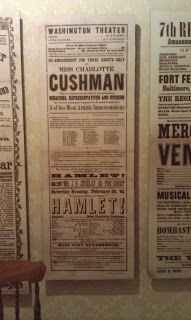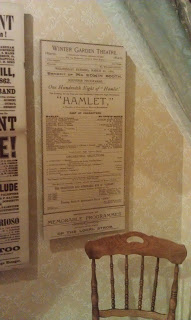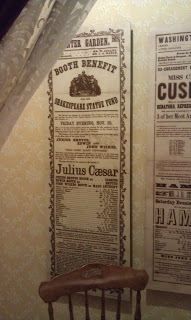“Very good,” Georgianna replies. “Now can you find someone else from that play?”
Category: Uncategorized
Most of the posts in this category are simply leftovers from a previous era before the site had categories. Over time I plan to reduce that number to zero and remove this category. Until then, here they are. I had to put something in the box.
A Natural History of Shakespeare
During my browse through that “Alphabet of History” I also spotted the really cool Natural History of Shakespeare. This is not a book *about* Shakespeare, per se – this is a collection of quotes from Shakespeare’s work, organized by what bits of nature he mentioned:
This posting marathon, in celebration of Shakespeare Day, is brought to you by nothing but my time, my resources, and my love for the subject. While we’ll always be the original Shakespeare blog, it takes a significant amount of effort to make us the best in the digital universe. If you’ve not yet seen how you can show your support, now’s a great opportunity. If you’ve already done so, thanks very much!
The Good Booth
While in Washington D.C. we of course visited Ford’s Theatre (see post on the subject, possibly coming soon) so of course I spent most of the time talking about the Booths and their Shakespeare connection.
What I did not realize is that Edwin, the good one, is buried right here in Massachusetts. What do you think, does the picture of him look anything like the engraving on his tomb? I don’t see it. Then again the tomb version I’m sure was of him as an older man. Bonus history geek points if you already knew the ironic (?) story about Edwin saving the life of Lincoln’s son when he pulled him out of the way of an oncoming train.
If you ever get the chance, don’t miss Prince of Players – starring Richard Burton as Edwin himself. An absolutely fascinating movie that has a surprising amount of Shakespeare in it, and manages to tell the story of the man who shot Lincoln as nothing but a subplot. I loved it.
This posting marathon, in celebration of Shakespeare Day, is brought to you by nothing but my time, my resources, and my love for the subject. While we’ll always be the original Shakespeare blog, it takes a significant amount of effort to make us the best in the digital universe. If you’ve not yet seen how you can show your support, now’s a great opportunity. If you’ve already done so, thanks very much!
Lincoln, on Shakespeare
We’ve certainly covered the relationship between President Abraham Lincoln and William Shakespeare previously. So when I went to visit Ford’s Theatre, I wasn’t sure how much Shakespeare I’d find. Who am I kidding, if I’d spotted any Shakespeare at all I would have considered it a win.
Win!
I wish I could read Lincoln’s writing to learn more about the argument. Who is this James Hackett person, and why is Lincoln having correspondence with him about Hamlet analysis? It’s one thing to hear about presidents who were in the habit of reading or quoting Shakespeare (there were a lot of them). Here we’ve got an example of the president in active discussion about the play. Not only that, he’s making a case not typically made (from my own personal experience). I wonder why the President of the United States of America is making the case that King Claudius’ private admission of how heavily the guilt for his crimes weighs upon him is greater than “To be or not to be,” widely regarded as one of the greatest soliloquies in our language?
This posting marathon, in celebration of Shakespeare Day, is brought to you by nothing but my time, my resources, and my love for the subject. While we’ll always be the original Shakespeare blog, it takes a significant amount of effort to make us the best in the digital universe. If you’ve not yet seen how you can show your support, now’s a great opportunity. If you’ve already done so, thanks very much!
Shakespeare at Ford’s Theatre
Heading down the stairs into the Ford’s Theatre Museum I was wondering how much Shakespeare I’d see. Turns out, quite a bit! They have a whole kiosk (if you can call it that) dedicated to the subject.
First up we have Miss Charlotte Cushman, performing “3 of her most artistic impressions”, including Hamlet! This is curious to me. I’m sure I’ve heard the name Charlotte Cushman before. In fact, I heard it just today in the same story where I read about Edwin Booth’s grave (in a separate post). Somebody tell us more about her? I thought Sarah Bernhardt (late 1800’s) was the first great female Hamlet? Or, rather, that’s what I always assumed, I suppose.
Look at that. The whole Booth family, starring in Julius Caesar. Junius Brutus Booth, the father, as Julius Caesar. Edwin as Brutus. John Wilkes as Marc Antony. Insert some sort of clever observation here about how maybe “the bad one” should have played Brutus? Also of note, there’s a “Mr. C.K. Chester” in the credits – I wonder the relation to S K Chester above?
The poster clearly shows this performance as some sort of special occasion. I’ll bet it was! Does this show mark a historic event of some sort? That is, do we know more about it? When was the date relative to Lincoln’s assassination? Was it a travelling show, or a one time event? Were Edwin and his brother rotating parts?
I have one more picture of the Shakespeare booth (ha! get it? booth?) from Ford’s Theatre, but I’m saving that for another post…
This posting marathon, in celebration of Shakespeare Day, is brought to you by nothing but my time, my resources, and my love for the subject. While we’ll always be the original Shakespeare blog, it takes a significant amount of effort to make us the best in the digital universe. If you’ve not yet seen how you can show your support, now’s a great opportunity. If you’ve already done so, thanks very much!

